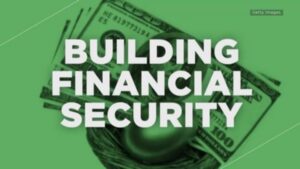[ad_1]
Financial security is something that means something different to everyone. Financial security refers to the peace of mind you feel when you aren’t worried about your income being enough to cover your expenses.

It also means that you have enough money saved to cover emergencies and your future financial goals. When you are financially secure, your stress levels goes down, leaving you free to focus on other issues.
Knowing what it takes for you to feel financially secure is an important part of building that security, but generally, you want to have an emergency fund, be able to contribute to your retirement, pay your bills each month, and have a little extra for unexpected expenses and treats.
A security is a tradable financial asset. The term commonly refers to any form of financial instrument, but its legal definition varies by jurisdiction.
How To Build your Financial Security
1. Creating a Career that Gives Your Freedom
Having a career that you love and that compensates you for your effort is an important part of financial security. Everyone has heard stories of people that find amazing jobs with no higher education, but those experiences are the exception rather than the rule.
Being able to invest in yourself with education is the best way to ensure that you are employable. When working on building financial security, it can be difficult to think about taking on new debt, but student loans are an investment in your future.
Earning a degree that makes you employable will increase your income over the life of your career. You will enjoy the benefits of your degree long after those loans are paid off.
2. Don’t Put Off Funding Your Retirement
Compound interest is the magic of building a healthy retirement fund. It can be difficult to find money to stash away when you are young and not making much money, but the money you invest in your younger years has much more time to grow.
Saving even a small percentage of your income for retirement from the time you start working will make retirement planning much less stressful.
3. Prioritize Your Goals
Everyone has different goals for their life, and that is alright. The important thing is to determine what those goals are and develop a plan for reaching them. If owning a home is important to you, prioritize those savings.
If it is important to you that one parent stays home with future kids while they are young, start saving for that. No one can decide what your financial goals are but you.
Finding money through cutting expenses or picking up a side job is much more appealing if you have a plan for where that money is going, whether it is going to fund something fun like a vacation or something more boring, like savings for a home remodeling project.
Importance of an Emergency Fund.
The first thing you should do when working on your financial security is to build an emergency fund. The amount in this fund will vary depending on your situation and your comfort level.
If you are your only means of support, it makes sense to have a larger emergency fund than someone with a spouse. It is unlikely that you will both face a job loss or other financial emergencies at the same time.
Savings that cover between three months and a year of living expenses is an excellent goal. Depositing this money in a high yield savings account allows it to grow while still being easy to access.
Conclusion:
Feeling financially secure requires knowing what your assets and liabilities are, as well as how your income compares to your expenses.
If you aren’t tracking these, you might not know you’re struggling, but that’s like an ostrich sticking its head in the sand and hoping for the best.
For true financial security, create a budget that addresses both your current needs, like food, clothing and shelter, and your long-term goals, like paying down debt and saving. You should also include insurance to cover the what-ifs in life.
[ad_2]
Source link



